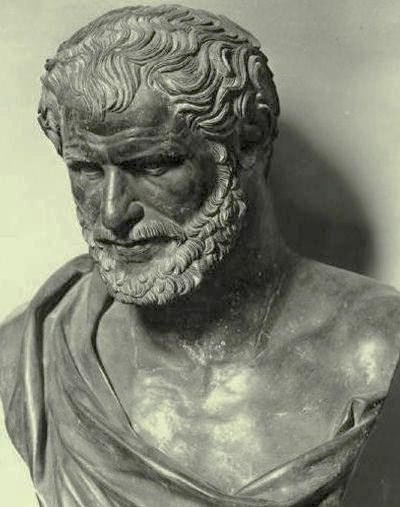
Demokrit Berühmte Zitate

„Kraft und Schönheit sind der Jugend Güter, des Alters Blüte aber ist Besonnenheit.“
Fragment 294; zitiert nach Karl Jaspers: Die grossen Philosophen: Darstellungen und Fragmente, Nachlaß Bd. 1, hg. von Hans Saner, Piper, München 1981. S. 72
Demokrit Zitate und Sprüche
„Scheinbar ist Farbe, scheinbar Süßigkeit, scheinbar Bitterkeit: wirklich nur Atome und Leeres.“
Fragment 125 (gemäß Galenos von Pergamon); Übers. durch Hermann Diels: Die Fragmente der Vorsokratiker, griechisch und deutsch, Zweiter Band, 3. Aufl., Berlin 1912. S. 85 Internet Archive
„In Wirklichkeit erkennen wir nichts; denn die Wahrheit liegt in der Tiefe.“
Fragment 117
Original griech.: "ἐτεῆι δὲ οὐδὲν ἴδμεν· ἐν βυθῶι γὰρ ἡ ἀλήθεια"
Demokrit: Zitate auf Englisch
“Strength and beauty are the blessings of youth; temperance, however, is the flower of old age.”
Fragment quoted in H. Diels and W. Kranz (eds.) Die Fragmente der Vorsokratiker, Vol. II (1952), no. 294; reference taken from Webster's New World Dictionary of Quotations (2005), p. 261
Source Book in Ancient Philosophy (1907), The Golden Sayings of Democritus
“Those who have a well-ordered character lead also a well-ordered life.”
Source Book in Ancient Philosophy (1907), The Golden Sayings of Democritus
“Moderation multiplies pleasures, and increases pleasure.”
Freeman (1948), p. 163
Variante: Moderation increases enjoyment, and makes pleasure even greater.
“A life without a holiday is like a long journey without an inn to rest at.”
Source Book in Ancient Philosophy (1907), The Golden Sayings of Democritus
Source Book in Ancient Philosophy (1907), The Golden Sayings of Democritus
Source Book in Ancient Philosophy (1907), The Golden Sayings of Democritus
“The hopes of the right-minded may be realized, those of fools are impossible.”
Source Book in Ancient Philosophy (1907), The Golden Sayings of Democritus
Source Book in Ancient Philosophy (1907), The Fragments
“Neither art nor wisdom may be attained without learning.”
Source Book in Ancient Philosophy (1907), The Golden Sayings of Democritus
“Not from fear but from a sense of duty refrain from your sins.”
Source Book in Ancient Philosophy (1907), The Golden Sayings of Democritus
“No power and no treasure can outweigh the extension of our knowledge.”
Durant (1939), Ch. XVI, §II, p. 354; citing J. Owen, Evenings with the Skeptics, London, 1881, vol. 1, p. 149.
“The pleasures that give most joy are the ones that most rarely come.”
Source Book in Ancient Philosophy (1907), The Golden Sayings of Democritus
“Democritus said he would rather discover a single demonstration than win the throne of Persia.”
Source Book in Ancient Philosophy (1907), The Golden Sayings of Democritus
Source Book in Ancient Philosophy (1907), The Golden Sayings of Democritus
“Strength of body is nobility in beasts of burden, strength of character is nobility in men.”
Source Book in Ancient Philosophy (1907), The Golden Sayings of Democritus
By convention sweet is sweet, bitter is bitter, hot is hot, cold is cold, color is color; but in truth there are only atoms and the void. (trans. Durant 1939), Ch. XVI, §II, p. 353; citing C. Bakewell, Sourcebook in Ancient Philosophy, New York, 1909, "Fragment O" (Diels), p. 60
Source Book in Ancient Philosophy (1907), The Golden Sayings of Democritus
“It is hard to fight desire; but to control it is the sign of a reasonable man.”
Freeman (1948), p. 165
Variante: It is hard to fight with desire; but to overcome it is the mark of a rational man.
“The animal needing something knows how much it needs, the man does not.”
Freeman (1948), p. 162
Variante: The needy animal knows how much it needs, but the needy man does not.
“For a man petticoat government is the limit of insolence.”
Source Book in Ancient Philosophy (1907), The Golden Sayings of Democritus
“Fame and wealth without wisdom are unsafe possessions.”
Source Book in Ancient Philosophy (1907), The Golden Sayings of Democritus
“Making money is not without its value, but nothing is baser than to make it by wrong-doing.”
Source Book in Ancient Philosophy (1907), The Golden Sayings of Democritus
“Verily we know nothing. Truth is buried deep.”
Another translation: "Of truth we know nothing, for truth is in a well." Diogenes Laertius, Lives of Eminent Philosophers R.D. Hicks, Ed. http://www.perseus.tufts.edu/hopper/text?doc=Perseus:abo:tlg,0004,001:9:11
Source Book in Ancient Philosophy (1907), The Fragments
Source Book in Ancient Philosophy (1907), The Golden Sayings of Democritus
“[I would] rather discover one cause than gain the kingdom of Persia.”
Freeman (1948), p. 155
Durant (1939),Ch. XVI, §II, p. 352, citinas G.Grote, Plato and the Other Companions of Socrates (London, 1875), vol. 1, p. 68; and citing C. Bakewell, Sourcebook in Ancient Philosophy, New York, 1909, p. 62.
Variante: I would rather discover a single demonstration [in geometry] than become king of the Persians.
Source Book in Ancient Philosophy (1907), The Golden Sayings of Democritus
“To a wise man, the whole earth is open; for the native land of a good soul is the whole earth.”
Freeman (1948), p. 166
Durant (1939), Ch. XVI, §II, p. 352 (footnote); citing F. Uberweg, History of Philosophy, New York, 1871, vol. 1, p. 71.
Variante: To a wise and good man the whole earth is his fatherland.
Source Book in Ancient Philosophy (1907), The Golden Sayings of Democritus
